| Listing 1 - 9 of 9 |
Sort by
|
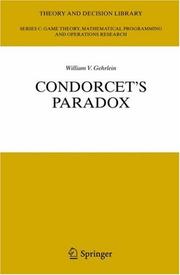
ISBN: 3540337989 3642070353 9786610615476 1280615478 3540337997 9783540337980 Year: 2006 Volume: 40 Publisher: Berlin New York Springer
Abstract | Keywords | Export | Availability | Bookmark
 Loading...
Loading...Choose an application
- Reference Manager
- EndNote
- RefWorks (Direct export to RefWorks)
Paradoxes --- Game theory --- Voting --- Economics --- Economics, Mathematical --- Mathematics --- Operations research --- Political science --- Mathematical models --- Voting - Mathematical models
Book
ISSN: 10559426 ISBN: 9780821837986 0821837982 Year: 2005 Volume: 22 Publisher: Providence, R.I. AMS
Abstract | Keywords | Export | Availability | Bookmark
 Loading...
Loading...Choose an application
- Reference Manager
- EndNote
- RefWorks (Direct export to RefWorks)
Operational research. Game theory --- Political sociology --- Voting --- Elections --- Social choice --- Game theory --- Social sciences --- Mathematical models --- Voting - Mathematical models --- Elections - Mathematical models --- Social sciences - Mathematical models
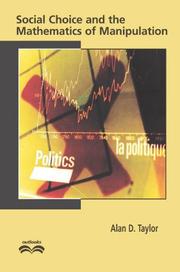
ISBN: 0521008832 0521810523 9780521008839 9780521810524 9780511614316 0511115385 9780511115387 9780511114830 0511114834 0511614314 1280449470 9781280449475 1107132363 9781107132368 0511197217 9780511197215 0511298587 9780511298585 051117148X Year: 2005 Publisher: Cambridge Cambridge University Press
Abstract | Keywords | Export | Availability | Bookmark
 Loading...
Loading...Choose an application
- Reference Manager
- EndNote
- RefWorks (Direct export to RefWorks)
Honesty in voting, it turns out, is not always the best policy. Indeed, in the early 1970s, Allan Gibbard and Mark Satterthwaite, building on the seminal work of Nobel laureate Kenneth Arrow, proved that with three or more alternatives there is no reasonable voting system that is non-manipulable; voters will always have an opportunity to benefit by submitting a disingenuous ballot. The ensuing decades produced a number of theorems of striking mathematical naturality that dealt with the manipulability of voting systems. This 2005 book presents many of these results from the last quarter of the twentieth century, especially the contributions of economists and philosophers, from a mathematical point of view, with many new proofs. The presentation is almost completely self-contained, and requires no prerequisites except a willingness to follow rigorous mathematical arguments. Mathematics students, as well as mathematicians, political scientists, economists and philosophers will learn why it is impossible to devise a completely unmanipulable voting system.
Microeconomics --- Voting --- Social choice --- Political science --- Game theory. --- Mathematical models. --- Games, Theory of --- Theory of games --- Mathematical models --- Mathematics --- Polls --- Elections --- Politics, Practical --- Suffrage --- Balloting --- Voting - Mathematical models. --- Social choice - Mathematical models. --- Political science - Mathematical models.
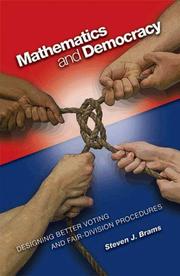
ISBN: 1282531603 9786612531606 1400835593 0691133212 9781400835591 0691133204 9780691133201 9780691133218 9781282531604 6612531606 Year: 2009 Publisher: Princeton, NJ
Abstract | Keywords | Export | Availability | Bookmark
 Loading...
Loading...Choose an application
- Reference Manager
- EndNote
- RefWorks (Direct export to RefWorks)
Voters today often desert a preferred candidate for a more viable second choice to avoid wasting their vote. Likewise, parties to a dispute often find themselves unable to agree on a fair division of contested goods. In Mathematics and Democracy, Steven Brams, a leading authority in the use of mathematics to design decision-making processes, shows how social-choice and game theory could make political and social institutions more democratic. Using mathematical analysis, he develops rigorous new procedures that enable voters to better express themselves and that allow disputants to divide goods more fairly. One of the procedures that Brams proposes is "approval voting," which allows voters to vote for as many candidates as they like or consider acceptable. There is no ranking, and the candidate with the most votes wins. The voter no longer has to consider whether a vote for a preferred but less popular candidate might be wasted. In the same vein, Brams puts forward new, more equitable procedures for resolving disputes over divisible and indivisible goods.
Elections - Mathematical models. --- Elections -- Mathematical models. --- Finance, Public - Mathematical models. --- Finance, Public -- Mathematical models. --- Voting - Mathematical models. --- Voting -- Mathematical models. --- Voting --- Elections --- Finance, Public --- Government - General --- Political Institutions & Public Administration - General --- Law, Politics & Government --- Mathematical models --- Electoral politics --- Franchise --- Polls --- Mathematical models. --- Politics, Practical --- Social choice --- Suffrage --- Political science --- Plebiscite --- Political campaigns --- Representative government and representation --- JSTOR-DDA --- Public finance --- Multi-User. --- E-books --- Balloting
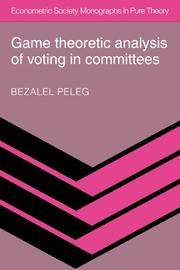
ISBN: 0521259649 0521074657 1139052284 9780521259644 9781139052283 9780521074650 Year: 1984 Volume: 7 Publisher: Cambridge : Cambridge University Press,
Abstract | Keywords | Export | Availability | Bookmark
 Loading...
Loading...Choose an application
- Reference Manager
- EndNote
- RefWorks (Direct export to RefWorks)
This book is a theoretical and completely rigorous analysis of voting in committees that provides mathematical proof of the existence of democratic voting systems, which are immune to the manipulation of preferences of coalitions of voters. The author begins by determining the power distribution among voters that is induced by a voting rule, giving particular consideration to choice by plurality voting and Borda's rule. He then constructs, for all possible committees, well-behaved representative voting procedures which are not distorted by strategic voting, giving complete solutions for certain important classes of committees. The solution to the problem of mass elections is fully characterised.
Social choice --- Voting --- Committees --- Game theory --- Choix collectif --- Vote --- Comités --- Théorie des jeux --- Mathematical models --- Modèles mathématiques --- Comités --- Théorie des jeux --- Modèles mathématiques --- Mathematical models. --- Business, Economy and Management --- Economics --- Social choice - Mathematical models --- Voting - Mathematical models --- Committees - Mathematical models --- Game theory. --- Games, Theory of --- Theory of games --- Mathematics --- Associations, institutions, etc. --- Meetings --- Balloting --- Polls --- Elections --- Politics, Practical --- Suffrage
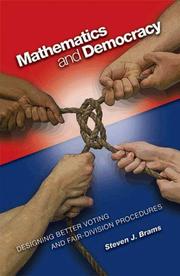
ISBN: 9780691133201 9780691133218 0691133204 0691133212 Year: 2008 Publisher: Princeton Princeton university press
Abstract | Keywords | Export | Availability | Bookmark
 Loading...
Loading...Choose an application
- Reference Manager
- EndNote
- RefWorks (Direct export to RefWorks)
Voting --- Elections --- Finance, Public --- Mathematical models --- 324 --- -Elections --- -Finance, Public --- -324.601513 --- Cameralistics --- Public finance --- Currency question --- Electoral politics --- Franchise --- Polls --- Political science --- Politics, Practical --- Plebiscite --- Political campaigns --- Representative government and representation --- Social choice --- Suffrage --- Verkiezingen --algemeen --- 324 Verkiezingen --algemeen --- 324.601513 --- Balloting --- Voting - Mathematical models --- Elections - Mathematical models --- Finance, Public - Mathematical models
Book

ISBN: 0231153287 0231526865 9780231153287 Year: 2014 Publisher: New York, NY : Columbia University Press,
Abstract | Keywords | Export | Availability | Bookmark
 Loading...
Loading...Choose an application
- Reference Manager
- EndNote
- RefWorks (Direct export to RefWorks)
Kenneth J. Arrow's pathbreaking "impossibility theorem" was a watershed innovation in the history of welfare economics, voting theory, and collective choice, demonstrating that there is no voting rule that satisfies the four desirable axioms of decisiveness, consensus, non-dictatorship, and independence. In this book Eric Maskin and Amartya Sen explore the implications of Arrow's theorem. Sen considers its ongoing utility, exploring the theorem's value and limitations in relation to recent research on social reasoning, and Maskin discusses how to design a voting rule that gets us closer to the ideal-given the impossibility of achieving the ideal. The volume also contains a contextual introduction by social choice scholar Prasanta K. Pattanaik and commentaries from Joseph E. Stiglitz and Kenneth J. Arrow himself, as well as essays by Maskin, Dasgupta, and Sen outlining the mathematical proof and framework behind their assertions.
Voting --- Social choice --- Probabilities --- Voting - Mathematical models --- Social choice - Mathematical models --- Probabilities - Mathematical models --- Arrow, Kenneth Joseph, - 1921-2017 --- Voting. --- Social choice. --- Probabilities. --- Mathematical models. --- Balloting --- Polls --- Elections --- Politics, Practical --- Suffrage --- Probability --- Statistical inference --- Combinations --- Mathematics --- Chance --- Least squares --- Mathematical statistics --- Risk --- Choice, Social --- Collective choice --- Public choice --- Choice (Psychology) --- Social psychology --- Welfare economics
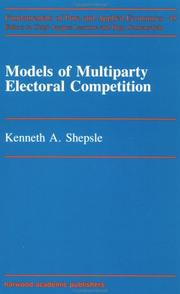
ISBN: 3718650762 9783718650767 Year: 1991 Volume: 45 Publisher: New York (N.Y.): Harwood
Abstract | Keywords | Export | Availability | Bookmark
 Loading...
Loading...Choose an application
- Reference Manager
- EndNote
- RefWorks (Direct export to RefWorks)
Competition --- Voting --- Elections --- Political parties --- Mathematical models --- 324 --- 329.7 --- 330.105 --- -Elections --- -Political parties --- -Voting --- -Polls --- Politics, Practical --- Social choice --- Suffrage --- Parties, Political --- Party systems, Political --- Political party systems --- Political science --- Divided government --- Intra-party disagreements (Political parties) --- Political conventions --- Electoral politics --- Franchise --- Polls --- Plebiscite --- Political campaigns --- Representative government and representation --- Competition (Economics) --- Competitiveness (Economics) --- Economic competition --- Commerce --- Conglomerate corporations --- Covenants not to compete --- Industrial concentration --- Monopolies --- Open price system --- Supply and demand --- Trusts, Industrial --- Verkiezingen --algemeen --- Politieke partijen diverse --- Wiskundige economie. Wiskundige methoden in de economie --- Mathematical models. --- -Verkiezingen --algemeen --- 330.105 Wiskundige economie. Wiskundige methoden in de economie --- 329.7 Politieke partijen diverse --- 324 Verkiezingen --algemeen --- -330.105 Wiskundige economie. Wiskundige methoden in de economie --- Economic aspects --- Balloting --- Competition - Mathematical models --- Voting - Mathematical models --- Elections - Mathematical models --- Political parties - Mathematical models
Book
ISBN: 3642031064 9786612971655 3642031072 1282971654 9783642031069 Year: 2010 Publisher: Berlin : Springer,
Abstract | Keywords | Export | Availability | Bookmark
 Loading...
Loading...Choose an application
- Reference Manager
- EndNote
- RefWorks (Direct export to RefWorks)
The likelihood of observing Condorcet's Paradox is known to be very low for elections with a small number of candidates if voters’ preferences on candidates reflect any significant degree of a number of different measures of mutual coherence. This reinforces the intuitive notion that strange election outcomes should become less likely as voters’ preferences become more mutually coherent. Similar analysis is used here to indicate that this notion is valid for most, but not all, other voting paradoxes. This study also focuses on the Condorcet Criterion, which states that the pairwise majority rule winner should be chosen as the election winner, if one exists. Representations for the Condorcet Efficiency of the most common voting rules are obtained here as a function of various measures of the degree of mutual coherence of voters’ preferences. An analysis of the Condorcet Efficiency representations that are obtained yields strong support for using Borda Rule.
Voting --- Mathematical models. --- Condorcet, Jean-Antoine-Nicolas de Caritat, --- Political science. --- Political economy. --- Game theory. --- Economic theory. --- Public finance. --- Economics. --- Economic Theory/Quantitative Economics/Mathematical Methods. --- Political Economy. --- Public Economics. --- Political Science. --- Game Theory, Economics, Social and Behav. Sciences. --- Polls --- Elections --- Politics, Practical --- Social choice --- Suffrage --- Caritat, Jean-Antoine-Nicolas de, --- Condorcet, Antoine-Nicolas Caritat de, --- Condorcet, C.-F., --- Condorcet, Marie Jean Antoine Nicolas, --- Condorcet, --- De Caritat, Jean-Antoine-Nicolas, --- Kondorsė, Zhan Antuan, --- Mathematics. --- International Political Economy. --- Math --- Science --- Administration --- Civil government --- Commonwealth, The --- Government --- Political theory --- Political thought --- Politics --- Science, Political --- Social sciences --- State, The --- Cameralistics --- Public finance --- Currency question --- Economic theory --- Political economy --- Economic man --- Public finances --- Games, Theory of --- Theory of games --- Mathematical models --- Mathematics --- de Caritat, Jean-Antoine-Nicolas, --- Condorcet --- Condorcet, Jean-Antoine-Nicolas de Caritat --- de Condorcet, Marie Jean Antoine Nicolas de Caritat --- de Condorcet, Nicolas --- Schwartz, Joachim, --- Game theory --- Voting - Mathematical models --- Paradoxes --- Condorcet, Jean-Antoine-Nicolas de Caritat, - marquis de, - 1743-1794
| Listing 1 - 9 of 9 |
Sort by
|

 Search
Search Feedback
Feedback About UniCat
About UniCat  Help
Help News
News